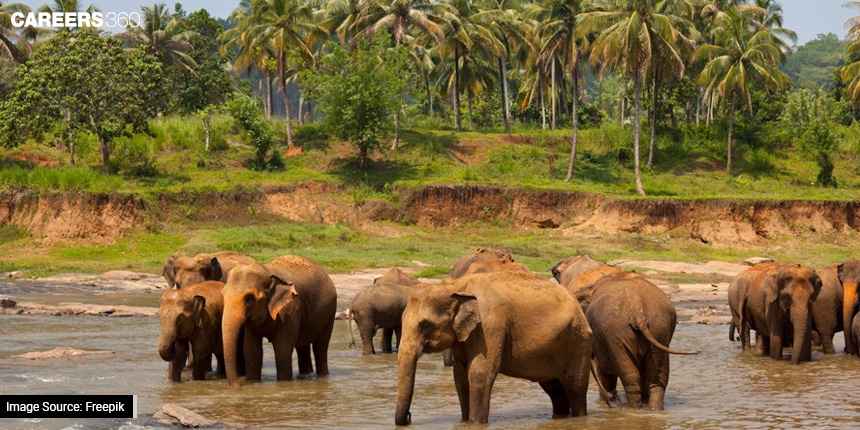Careers Opportunities In Wildlife And Environment Conservation
Over the last century, our planet has witnessed an escalating environmental crisis, from climate change and habitat loss to the alarming decline in biodiversity. As humanity grapples with these challenges, the importance of conserving our natural world has never been more critical. This brings us to the dynamic field of wildlife science and environmental conservation, and professionals in this sector stand at the forefront of the battle to protect our planet.

Wildlife Science is a multidisciplinary field that encompasses the study of animals, their habitats, and the complex ecosystems they inhabit. It seeks to unravel the mysteries of the natural world, from the smallest insects to the largest mammals. This branch of science not only enhances our understanding of biodiversity but also equips us with the knowledge needed to safeguard it.
Environmental Issues, on the other hand, address the myriad challenges threatening our planet. From pollution and deforestation to over-exploitation of resources, these issues demand urgent attention and innovative solutions. Professionals in this field work tirelessly to mitigate environmental damage and steer humanity towards a more sustainable future. Let's explore why aspiring students should embrace this course and embark on a journey towards a rewarding and fulfilling career.
Also Read- Public and Private Sector Employment: Things You Should Know
Scope and Career Opportunities
Wildlife Biologist
Wildlife biologists study animal behaviour, populations, and habitats to inform conservation efforts. They work with governments, NGOs, and research institutions, contributing to the preservation of endangered species and the restoration of ecosystems. Their work involves fieldwork, data analysis, and contributing to biodiversity preservation. The demand for wildlife biologists is on the rise as ecosystems face increasing threats.
Environmental Scientist
Environmental scientists analyse the impact of human activities on the environment. They conduct research, assess pollution levels, and develop strategies for sustainable resource management.
Environmental Consultants
Environmental consultants assess the impact of human activities on the environment and help organisations comply with regulations. With companies increasingly focusing on sustainability, environmental consultants play a vital role in guiding businesses towards eco-friendly practices.
Environmental Advocate
Environmental advocates raise awareness about critical environmental issues, lobby for policy changes, and engage in public outreach and education. Their work is instrumental in shaping environmental policies and promoting sustainable practices.
Conservationist
Conservationists work tirelessly to protect natural resources and wildlife habitats. They collaborate with communities and organisations to implement conservation plans and promote biodiversity.
Ecologist
Ecologists study the relationships between organisms and their environments. They investigate how ecosystems function and contribute to the development of strategies for sustainable land use.
Environmental Educator
Educators in this field play a crucial role in raising awareness about environmental issues. They work in schools, museums, and outreach programmes, inspiring future generations to become stewards of the environment.
Wildlife Photographer/Filmmaker
Visual storytelling is a powerful tool for conservation. Wildlife photographers and filmmakers capture the beauty and struggles of wildlife, raising awareness and funds for conservation efforts.
Environmental Policy Analyst
Policy analysts shape environmental regulations and policies at local, national, and international levels. They work with governments and advocacy groups to advocate for sustainable practices.
Why is the field so popular?
The growing awareness of this field is testimony to the fact that coming generations will have professionals that will work in tandem with each other to protect, sustain and conserve our planet and its inhabitants. Young aspirants must understand why this sector is gaining momentum.
Global Awareness
Increasing media coverage and educational initiatives have heightened global awareness about environmental issues. This has led to a surge in interest in related courses. The world needs more experts to tackle environmental challenges, leading to a high demand for qualified professionals.
Corporate Sustainability
Companies are recognizing the importance of sustainability and environmental responsibility. This has created a demand for professionals who can guide them towards greener practices.
Policy Emphasis
Governments worldwide are enacting environmental policies and regulations, driving the need for experts who can navigate and influence these policies.
Personal Fulfilment
Many individuals are drawn to these fields by a genuine desire to make a positive impact on the planet, resulting in a highly motivated and passionate workforce.
Technological Advancements
The integration of technology in environmental research and conservation has opened up new career avenues, attracting tech-savvy individuals.
As the world grapples with various environmental challenges, the need for skilled professionals in wildlife science and environmental issues becomes increasingly evident. These fields offer you the opportunity to make a meaningful impact while having promising career prospects. The surge in popularity and demand for these courses highlights the urgency of the global environmental crisis and the growing recognition of the roles that professionals in these fields can play in shaping a sustainable future.